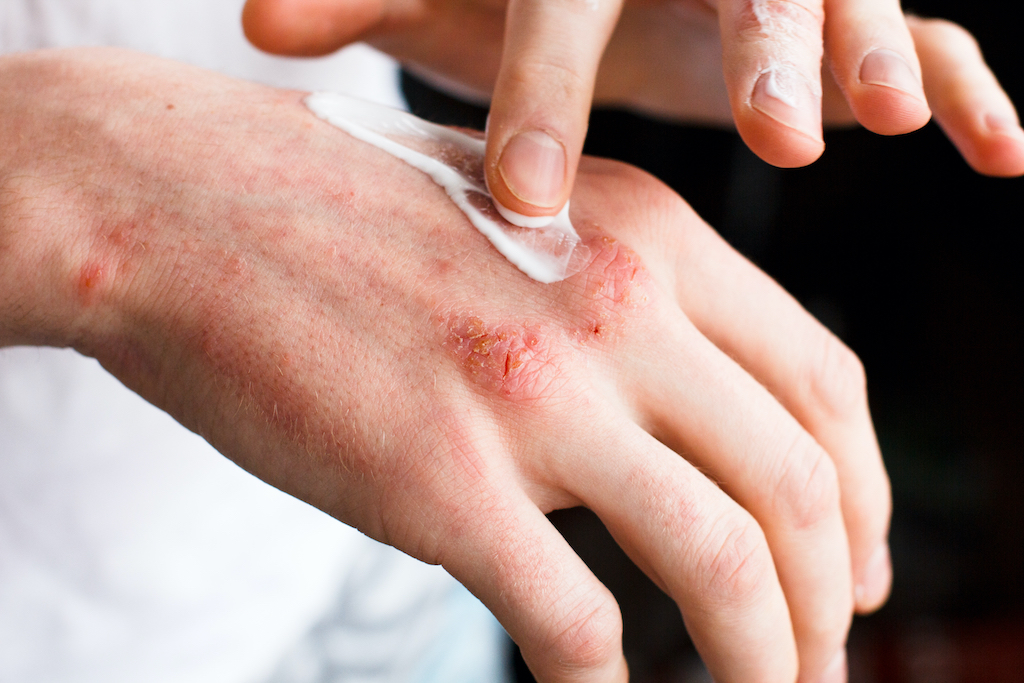Dr. Tina Abraham is a board-certified adult and pediatric allergist and immunologist who completed her fellowship at University Hospitals Cleveland Medical Center in July 2018. She was chief of her allergy immunology fellowship in Cleveland with numerous publications and research experience. Dr. Abraham is a Michigan native who specializes in the treatment and management of an extensive spectrum of allergic, respiratory, and skin disorders in both adults and children, including asthma, seasonal allergies/hay fever, sinus problems, postnasal drip, chronic cough, recurrent infections, immunologic diseases, rashes, hives, angioedema, eczema, as well as food and drug allergies. Haute Beauty discusses the cause of eczema with Dr. Abraham and treatment solutions that can control and relieve the itchiness.
 Photo Credit: ShutterstockHB: What are the causes of eczema?
Photo Credit: ShutterstockHB: What are the causes of eczema?
Eczema or Atopic Dermatitis (AD) is a skin condition where your skin becomes itchy, inflamed, and red. Your skin is your body’s initial barrier, and in conditions like AD, there is a defect in your barrier rendering the skin to be unable to provide this protection properly from allergens, infectious pathogens, and irritants. In children, food allergies can be a factor in causing AD.
HB: Where on the body can eczema typically be found?
AD can be found in numerous places on the body. In babies, it is most commonly on the face and scalp. It can also be common inside the bend of the elbows and behind the knees. Also, it can arise on the hands, wrists, feet, ankles, neck, upper chest, and eyelids.
 Photo Credit: ShutterstockHB: What are the telltale signs of eczema?
Photo Credit: ShutterstockHB: What are the telltale signs of eczema?
Telltale signs of AD are itching (which this can be quite severe and cause sleep disturbances), dry skin, reddish patches of skin that can become sensitive, crack, ooze, bleed from scratching, and eventually become discolored and thickened skin from all of these long term changes from what we call the “itch-scratch” cycle.
HB: What should you avoid if you have eczema and what are treatment solutions?
It is important to optimize your barrier, therefore, ensure that all your personal care products, soaps, lotions, laundry detergents, etc. are free and clear of all fragrance/scents and dyes. Moisturize your skin twice a day, every day especially after taking a bath or shower. Limit your bath or shower to 10-15 minutes, pat dry, and moisturize liberally. For your child, if there are food allergy triggers, it is important to identify and avoid these. A thorough consultation with a board-certified allergist can help you determine this. Aside from the AD skin hygiene mentioned above, in situations where your skin may be flaring, short courses of topical steroids may be employed. There are non-steroidal topical options, and due to the furtherance of science and medicine, there are biologic agents out there in the form of injectables, such as Dupilumab, which specifically targets the immune cells responsible for the underlying inflammation. This is reserved for severe cases of AD and a thorough investigation by your board-certified allergist or dermatologist can help identify if this may be a possible treatment option for you.
For more information, visit Dr. Tina Abraham's social media:






















